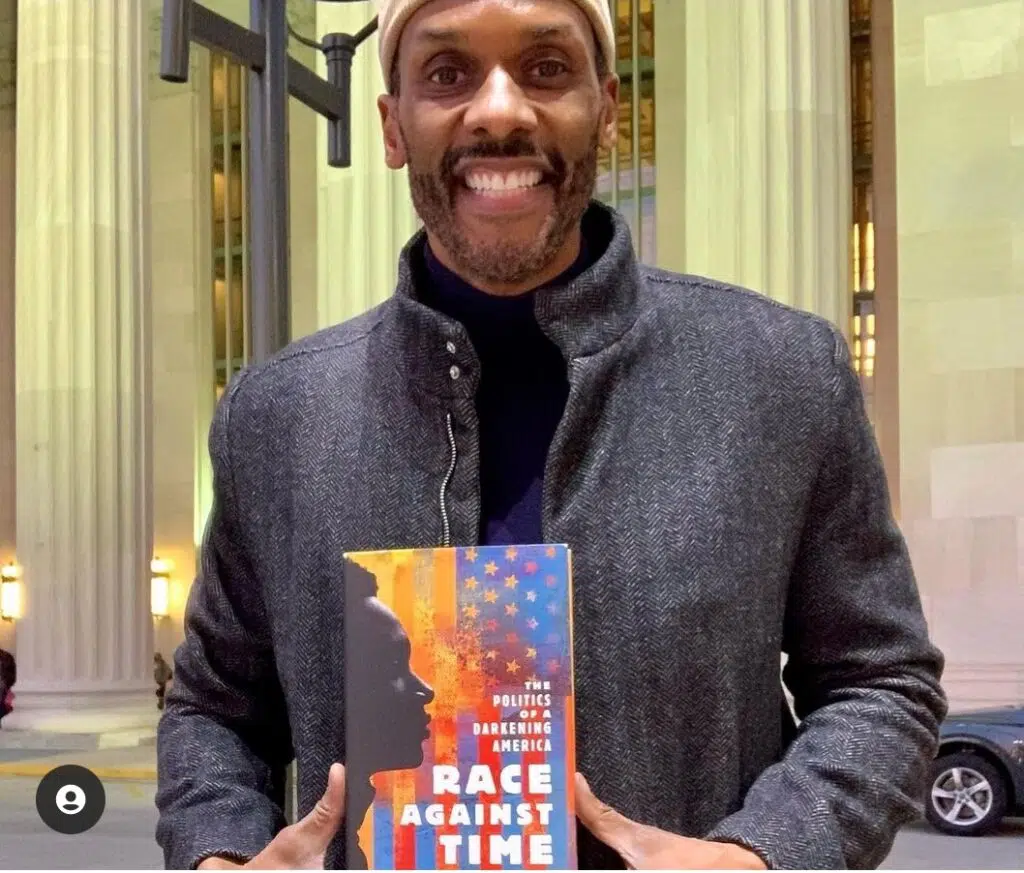Keith Boykin gives a unique perspective on the fear of the weakening of a white-dominated America.

I first heard about Keith Boykin through an old acquaintance back when he worked in the White House under the Clinton administration. I admit that I did not follow him too closely back then because I mainly focused on my studies and making the Canadian Olympic Track Team. However, with the rising popularity of social media, Keith Boykin’s name kept popping up on my timeline. I would observe as he debated with right-wing commentators and gave insightful opinions on political matters. However, I was always most impressed with his passionate views regarding race and racism, primarily when police shoot and kill unarmed Black men. Before I knew it, I followed him on Facebook, Twitter, and Instagram.
When I learned that he was writing a new book, I thought I could learn something new that he had not presented before. His fourth book does just that. Race Against Time: The Politics of a Darkening America gives an essential perspective on race and racism. Throughout the book, Keith Boykin uses his personal experiences, from being a Harvard University law student to working for the Clinton Administration, to being a CNN commentator, to argue his viewpoints. He presents hard facts that demonstrate white America’s fear of seeing white-dominated institutions replaced by ones that reflect the racial demographics of the country. In other words, this is what Boykin describes as the politics of a darkening of America.
Boykin brings the reader back to 1917 St Louis, Missouri. In this incident, he mentions how Black residents were violently attacked after a racist Op-Ed in the St. Louis Post-Dispatch falsely claimed they were stealing jobs from white Americans. The racists were so empowered that they attacked Black residents in broad daylight with impunity.

Boykin then compared it to Presidents Goldwater, Nixon, and even H.W. George Bush, where the latter weaponized white resentment towards Black Americans by using Willie Horton in his Presidential campaign ads. Horton made national headlines for being a kidnapper, rapist, and murderer. What made Horton significant was that he happened to be Black.
The strategy Bush used to get votes and win the election was to play on a racist stereotype that Black men were inherently violent. As Boykin wrote [Horton] was: the big, ugly, dumb, violent, Black ‘Willie’ who raped white women. By stoking white America’s fears about Black people, Bush not only succeeded in winning the election to become the 41st President of the United States, but he also succeeded in maintaining, if not reinforcing, an existing racial division in the country where African-Americans are constantly vilified.
I had one criticism, and that was Boykin’s soft stance on Bill Clinton and even softer stance on his wife, Hillary. Even though he called Clinton out on backtracking on allowing gay men and women in the military, he failed to mention how the Clinton Foundation grossly mishandled its work in Haiti after the country’s devastating earthquake in 2010. Even though international donors pledged around $13.3 billion to help the country recover, 89.6% went to non-Haitian organizations, 9.6% went to the Haitian government, and only a shocking 0.6% went to Haitian organizations.
This was not the first time Clinton was involved in a controversy with Haiti. In the 1990s, Clinton struck what has been referred to as a “Devil’s Bargain” with rice farmers in Arkansas. Government subsidies to these farmers enabled them to export rice at depressed prices. The subsidies were high enough that Arkansas rice farmers could afford to lower their rice prices to the point that rice farmers in the countries they were exporting to could not compete. Haiti was one of these countries, and their farmers suffered.
In the eyes of Haitians—both in Haiti and abroad—this is seen as a subtle form of racism. One cannot expect someone to act belligerently to Black people overseas and expect them to treat Black Americans any better. This foreign policy further destabilized Haiti economically, driving many Haitians to immigrate to other countries. Many were forced into extreme poverty. That, combined with the violence, were forced to flee to other countries as refugees. One must consider the optics when Clinton responded by continuing H.W. Bush’s ban on the Haitian exodus.
Given Bill Clinton’s disastrous treatment of Haitians, I’m surprised that Keith Boykin did not mention Hillary. During a 1994 speech supporting her husband’s 1994 Violent Crime Control and Law Enforcement Act, she coined the word superpredator to describe African-American youths. Not only did she defend a bill that was widely criticized for sending disproportionate numbers of African-Americans to prison, but Mrs. Clinton’s speech was also a racist dog whistle. Like her Republican predecessors, Mrs. Clinton also perpetuated the racist stereotype that Black men and youths are inherently more violent than white men. Those are serious micro-aggressions and they share similarities with H.W. Bush’s Willie Horton campaign ads.
Unfortunately for Mrs. Clinton, her “Superpredator” speech came back to haunt her when she ran against Donald Trump for President in 2016.
However, it was Boykin’s chapter about accountability that impressed me the most. None of us should be afraid nor ashamed to hold our leaders accountable for their actions. Neither should we, by default, throw our support behind a leader or a celebrity simply because we share the same skin color. This goes for both African-Americans, Hispanics, Asians, and white Americans.

For instance, Keith Boykin described his relationship with his grandmother. Her automatic dismissal of Anita Hill’s claims against then-Supreme Court nominee, Clarence Thomas, is an indictment of how many of us refuse to accept that certain people whom we are influenced by can never be at fault. In this instance, Boykin’s grandmother only saw a woman attacking a Black man—who was the dominant figure in her mind. Thus, he should never have his integrity questioned nor attacked despite Thomas’s views, and his actions were well documented to be very harmful to Black Americans over the years.
Without a doubt, Keith Boykin presents a distinct point of view on race relations in America—considering that he’s an openly gay Black man. As a reader, it was also a learning experience for me. In my opinion, Race Against Time: The Politics of a Darkening America should be part of the curriculum in every African-American studies program in universities across the United States. Considering I felt the chapter on accountability was the strongest and my only problem was Keith Boykin’s omissions of the Clintons’ racism, had Boykin devoted as little as a page to highlight these facts it would’ve been a subtle way of holding them accountable.
Race Against Time: The Politics of a Darkening America is now available in all bookstores.
Russell Brooks is the author of four suspense thrillers. His fifth, Jam Run, will be available in the second half of 2022.




